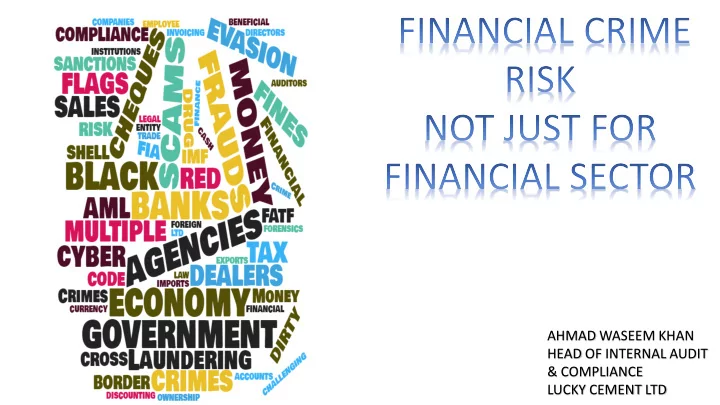

AHMAD WASEEM KHAN HEAD OF INTERNAL AUDIT & COMPLIANCE LUCKY CEMENT LTD
IS NON FINANCIAL SECTOR EXPOSED TO FINANCIAL CRIMES ?
“Where money is given to or received The process of disguising the proceeds from a different entity than the of crime and moving value through the services/goods were received from or use of trade transactions in an attempt provided to in order to transfer funds to legitimize their illicit origin without utilizing traditional banking channels”
• Companies/Entities knowingly i.e with “Willful Blindness” handle “dirty money” generated by a wide variety of illicit activities. • Companies that directly engage in criminal activity that generates illegal funds. • Companies that use funds for some illicit purposes. • Companies using shell companies to handle dirty money. • Companies using “Funnel Accounts” to handle dirty money.
Increased Administrative Burden in Risk of Investigations Risk of Being “De-Risked” Maintaining Banking Relationships •If there is no frame work in place to handle the •Banks and financial institutions will be •Termination of banking relationship raises a “Financial Crime Risks” then there is a greater generating number of queries for the fund host of problems for any corporate entity risk that the entity is exposed to an increased movement. •Entity’s ability to generate and collect funds is risk of investigations. •Businesses are now required to share greater greatly affected. •The frequency of such investigations will also details of their customers/dealers •Entity’s access to capital, letter of credit, loans, increase •Executing transactions with banking partners corporate credit cards etc becomes a serious •Entity will be exposed to a wide variety of law will become arduous and time consuming threats to operations. enforcement agencies local/federal •Delays in executing transactions can have •The cost of doing business will go substantially /international and this can become devastating implications on the business high cumbersome Risk of Fines & Penalties Risk of Loss of Reputation Increased Burden of Fighting a Legal Battle •If found guilty of willful blindness entity can •Organizations face serious reputational risk if •An entity will be spending huge sums in terms face huge fines, penalties and may face their name pops up in an AML fraud. of legal costs to avoid fines and penalties. criminal prosecution. •Loss of reputation leads to erosion of share •The administrative burden of handling legal •The size of such penalties /fines may affect the value queries and supplying correct/accurate company’s cash flow and in some cases may information may add up to •Administratively it becomes difficult to deal wipe-off sizable portion of entities equity. with financial institutions. •Due to reputational risk arises the risk of erosion of human capital
Define “Know Your Suspicious Activity Revisit The Distribution Enhance your own Customer” (KYC) policy Reporting (SAR) & Collection Channels AML Compliance at all distribution levels Framework Cutting Ties With Build In –House Do the deep digging Develop “Red Flags” to Customers/Dealers Compliance Function by KYCC- Know your highlight any high risk With Dubious For Scrutiny of All Customer’s Customer transaction Background Financial Transaction Invest in terms of Deny third party Define Risk policy for Use technology “Big Financial Resources & payments in your Jurisdictions known Data” to analyze high Manpower to Minimize accounts & From Your for smuggling or volume data to raise The Risk Accounts lawlessness any suspicious activity
A PRACTICAL APPROACH COLLECTION & PAYMENTS Not accepting third party cheques/pay- • orders from distributor/suppliers Denying request from counterparties for • unusually complex deal structures or structures with apparent business purpose Denying request from counterparties that • funds be delivered to apparently unconnected accounts • Payment of an invoice with multiple instruments of third and unknown parties Delisting of a customer, dealer, vendor due to • rumors/news of criminal or regulatory violations PREEMPTIVE CONTROLS • Enhance compliance where violations may trigger bank scrutiny. • Meeting all regulatory compliances for offshore payments & maintaining adequate documentation for future investigations. • Restricted approach in jurisdictions known known for smuggling or lawlessness
• Organization need to develop a well documented “Response Policy” defining the protocols to follow in case a query is raised or an investigation is initiated. • Organizations should be prepared to deal with the questions from the financial institution about potential compliance issues. A senior official should be defined as point of contact for • dealing with questions from banks that may implicate legal compliances Procedures should be in place for quickly elevating the • inquiry to the right legal /compliance authority for an appropriate response. • All evidence submitted against any query should be evaluated from all legal perspectives so as to ensure that the same will be used by law enforcing agencies in case of any complications. Falsification of records or submission of fabricated documents may at a later stage of investigation may jeopardies company’s image. Therefore the evidence should be submitted after review of the legal council
“Today’s heightened AML scrutiny of financial institutions has major potential consequences for their customers as well. Non Financial Institutions can protect them selves by enhancing their own compliance – especially in areas like AML which might raise red flags with banks and appropriately handle queries and concerns that their financial institutions may raise.” 10
THANK YOU
Recommend
More recommend